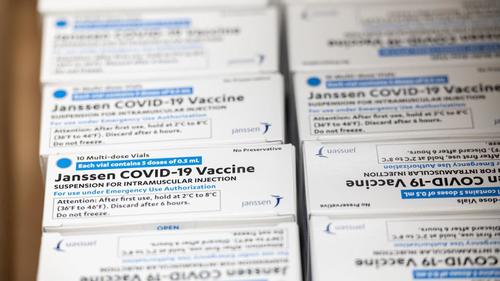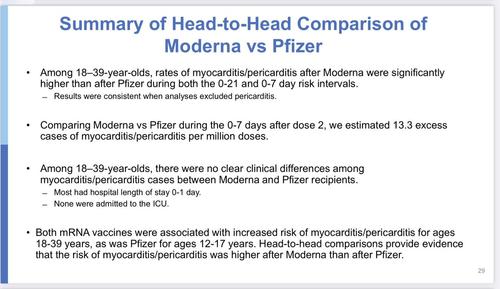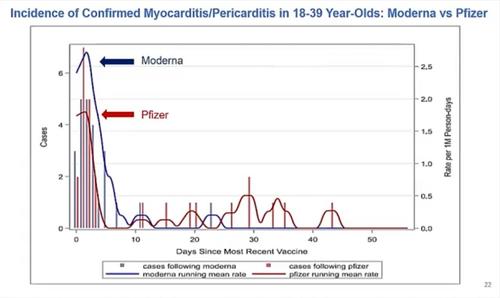by TYLER DURDEN
Update (1900ET): The CDC’s independent advisory panel voted unanimously to recommend booster doses of Moderna and Johnson & Johnson vaccine for certain populations and allow people to mix-and-match doses.
This aligns with The FDA’s authorization Wednesday night which said people could switch to whichever vaccine they wanted for their booster shot.
- Boosters for Moderna’s two-dose vaccine and J&J’s single-dose shot may be taken by Americans over 65, as well as those over 18 with a higher risk of severe COVID or exposure to the virus.
- Dosing for the Moderna booster will be less than its two-dose regiment and will be permitted six months after the third shot.
- J&J will be allowed after two months.
- The Food and Drug Administration authorization Wednesday night greenlit people could switch to whichever vaccine they wanted for their booster shot.
As a reminder, the committee in late September did not support a Pfizer booster for people in high-risk workforces but was overruled by CDC director Rochelle Walensky.
“We have to acknowledge where we’re in a situation where we don’t have as much data as we would like. But we still have to make practical decisions and I think there’s as much data to support mixing and matching as there is for boosters in general,” John Whyte, chief medical officer of WebMD, tells Axios.
* * *
Back in July, we reported on a study published in JAMA’s Cardiology journal which linked “acute chest pain” in male American soldiers to mRNA jabs. The pain, as researchers found, was caused by myocarditis and pericarditis, two different types of heart inflammation, which, as we now know, are rare but dangerous side effects of the mRNA vaccines.
About six weeks after that, the Washington Post published leaked data from a Canadian study which claimed that the risks of these types of dangerous side effects (which mostly occur in younger men) were significantly higher in patients given the Moderna jab vs. the Pfizer jab.
Now, one day after the FDA defied its own advisors by approving the Moderna jab and J&J jab for booster doses for practically all American adults (while also producing guidelines for mixing and matching of vaccines for booster doses), a CDC advisory panel met Thursday and, while reviewing all the data on safety and efficacy, finally admitted that the earlier warnings about the excess dangers associated with the Moderna jab have been confirmed.
What’s more, as the slide below says, rates of rare heart risks (myocarditis/pericarditis) among 18-39 year olds are higher for the Moderna jab than the Pfizer jab. But risks are still present for both, and it’s the younger patients (who least need the vaccines) who are most at risk for the side effects.
To be sure, the CDC advisory committee presentation notes claim that most cases of heart inflammation following vaccination are “generally mild, with prompt resolution of symptoms”. But keep in mind, that’s in adult patients under the age of 40, who are among the lowest risk for COVID (unless they have a weakened immune system, are obese or have any other issues that make them particularly vulnerable).
For a visualization of the risks of Moderna vs. Pfizer, check out the chart below, which was presented to the CDC’s Advisory Committee on Immunization Practices and relies on data gathered by Kaiser Permanente Northern California.
Of course, this data doesn’t include patients who received boosters, although some data have shown that booster doses raise the risk for rare side effects (though they do remain pretty rare).
When it comes to boosters, it is unclear if the myocarditis risk of the Moderna booster will be as high since the FDA and CDC are asking Moderna to reformulate boosters with a lower dose (since there’s also data showing that the Moderna jab’s efficacy is longer lasting than that of the Pfizer jab).
Unfortunately, ACIP member Keipp Talbot, who chairs a work group on COVID vaccine safety, told his colleagues on Thursday that there’s no way of knowing for certain right now if the risks from the Moderna jab will be lessened by giving boosters that are half the dose of the original courses.
Another advisory committee member said she’s worried about giving boosters of mRNA jabs to young men, and also worried about giving boosters of the J&J jab to young women (the J&J and AstraZeneca jabs have been linked to serious side effects and even deaths).
Finally, after reviewing all the safety and efficacy data, one observer who apparently monitored Thursday’s meeting still has a burning question: Will mRNA boosters lead to stabilized boosting? Or is mRNA protection inherently short-lived?
31. Here's the conclusion slide for the VE presentation.
Another thing I'd like to know: Will mRNA boosters lead to stabilized boosting? Or is mRNA protection inherently short-lived? @florian_krammer? @TheBcellArtist? @EJohnWherry? pic.twitter.com/MpPICsHPwH— Helen Branswell (@HelenBranswell) October 21, 2021
Thanks to the Biden Administration’s rush to dole out booster jabs due to the delta variant (and now, with the threat of the delta-plus variant looming on the horizon), it looks like we’ll all find out together.








